Can a Leona Lewis story really help you sleep at night?
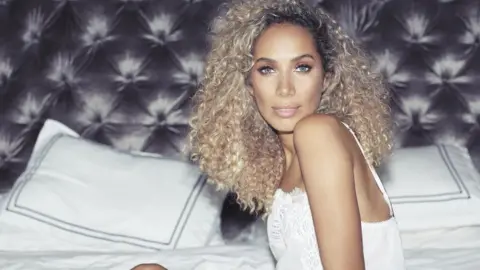 Calm
CalmSelf-care was the "App Trend of the Year", according to Apple, but as the January blues threaten, can an app or chatbot really reduce stress and anxiety, and help us sleep better?
When Katrina Cliffe started feeling stressed and anxious two years ago as she grappled with completing her diploma whilst relocating, the 35-year-old turned to technology for help.
"I was constantly 'switched on' and having to think from the moment I woke up to the moment I went to bed," says Ms Cliffe, who lives in Huddersfield and runs a marketing and PR agency.
"It would keep me awake into the early hours of the morning."
While experts have long warned us to refrain from using technology before we head to bed, Ms Cliffe preferred to do the exact opposite. She logged into Calm, an app designed to aid meditation and relaxation.
The app, which has been downloaded 39 million times so far, offers meditations, stories read by celebrities such as Leona Lewis, and music to aid sleep and reduce stress.
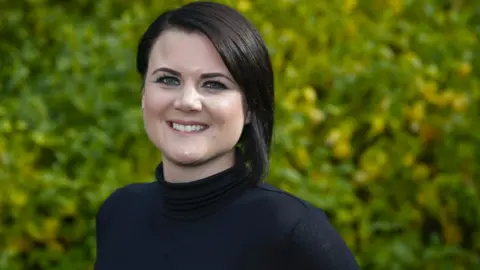 Katrina Cliffe
Katrina Cliffe"After having counselling and EMDR (eye movement desensitisation and reprocessing) therapy for PTSD (post-traumatic stress disorder) in 2017, Calm has helped me get through an incredibly stressful year," says Ms Cliffe.
"It's the perfect remedy to stop my mind going into overdrive and helps me switch off quickly and drift off to sleep."
As more people invest in their mental health, with concepts such as "mindfulness" infiltrating the public consciousness, the market for self-care apps is booming.
There are 4,000 of them on Apple's App Store and Google Play, with about $122m (£96m) spent globally on the top 10 apps in this category in 2018, up from $53m in 2017, according to mobile research firm Sensor Tower.
New York-based Shine sends users daily "pep talk" messages - "Your real self is your best self" for example - and offers audio motivational tracks and inspiring articles.
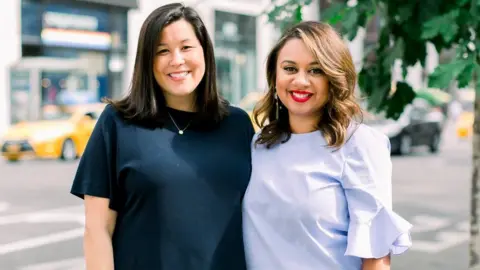 Yumi Matsuo
Yumi MatsuoCo-founder Marah Lidey says users tend to sign up to Shine "when there's a catalyst moment, such as turning 30, losing a job or getting excited about a new job".
"Shine is formulated to help ambitious people live a big life - and with self compassion," says Ms Lidey, using language typical of the genre. She founded Shine two years ago.
Aimed at millennials - young people who reached adulthood in the early 21st Century - Shine is "like an encouraging older sister", she says. "It's a hand on your shoulder every day."
Other apps, such as Happify, tap into cognitive behavioural therapy (CBT) techniques to nudge people out of negative ways of thinking.
"We teamed up with leading experts in positive psychology and mindfulness to create an emotional health tool that was not only based on rigorous research but also fun to use and accessible 24/7," explains Tomer Ben-Kiki, Happify's co-founder and chief executive.
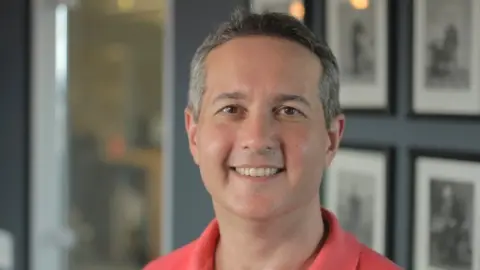 Happify
HappifyThe company works with 40 different experts in their respective fields, he says.
"We seek the best and brightest minds, from research scientists to meditation teachers to career coaches, to help us develop our different tracks [activities]."
The app offers its 3.5 million users science-based activities, games and meditations to help combat stress and anxiety, and promote positive thinking. Activities include noting down things you're grateful for and describing recent acts of kindness, for example.
But isn't there a tension at the heart of this trend?
A growing number of studies show a link between excessive use of digital gadgets and obesity and mental health problems, particularly among children. And a consistent piece of advice is that we shouldn't use smartphones and tablets right before bedtime, as the light from the screens and the content we read or watch can stimulate rather than soothe our brains.
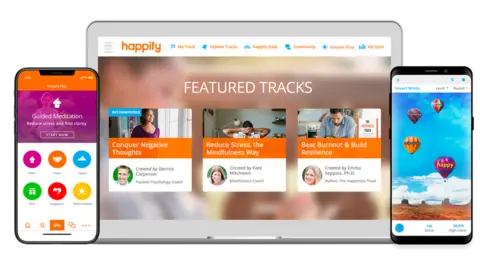 Happify
HappifyYet many self-care apps are aimed at improving the quality of our sleep.
"Many people need less technology in their lives, not more," says Brendan Kelly, professor of psychiatry at Trinity College Dublin.
"These people will not benefit from apps, no matter how well designed - they need to ditch the phone for defined periods each day."
But Prof Kelly concedes that these apps do provide motivation for some people and help them keep track of their progress.
"In essence, apps are useful tools that can be used wisely and well," he says, "but they are not the be-all-and-end-all for self-care. Often, less is more."


But Joanne Wilkinson, founder of My Possible Self, an app endorsed by the UK's National Health Service, disagrees. Her app offers learning modules on topics such as managing fear and anxiety.
"In this challenging environment, an educational app based on proven content in a highly accessible and user-friendly format can only help," she says.
"People spend increasing amounts of time on their mobile devices, so My Possible Self is very well placed to promote good mental health and wellbeing in the digital age."
But where's the evidence that they really work?
Research published in the journal Evidence-Based Mental Health in 2015 says mobile apps have "numerous shortfalls", including "the frequent lack of an underlying evidence base, a lack of scientific credibility and subsequent limited clinical effectiveness".
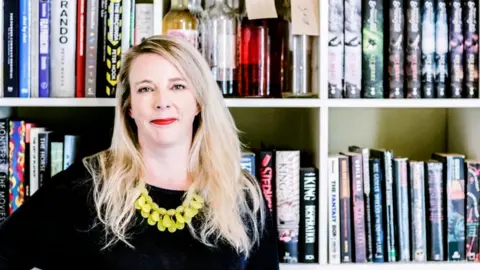 Sam Espensen
Sam EspensenSelf-diagnosis can even increase anxiety, the paper warned.
When Sam Espensen experienced a period of severe anxiety and was receiving trauma counselling for complex PTSD (CPTSD), she used a popular meditation app called Headspace for four months in 2017.
The 45-year-old from Bristol believes the app had a damaging effect on her mental health.
"I found meditating hard after I got to a certain point, because it would give me flashbacks to vivid memories of events relating to why I have CPTSD," she says.
"And when I did shut out the chatter of the world, instead of relaxing me, it made me feel intensely vulnerable and unhappy.
"I came to dread using [the app] because it was a portal to dark places, rather than the relaxing switch-off I had imagined."
Headspace's chief science officer, Dr Megan Jones Bell says: "Anyone with a mental health disorder should always consult with a qualified mental health professional about how best to use any self-help tools."
Mental health charity Mind believes self-care apps should be thought of as complementary to "real-world" mental health services, rather than a replacement for them.
"We want everyone who needs mental health support to be offered access to a range of high-quality treatments so that they get the support that's right for them, when they need it," says Eve Critchley, Mind's head of digital.
